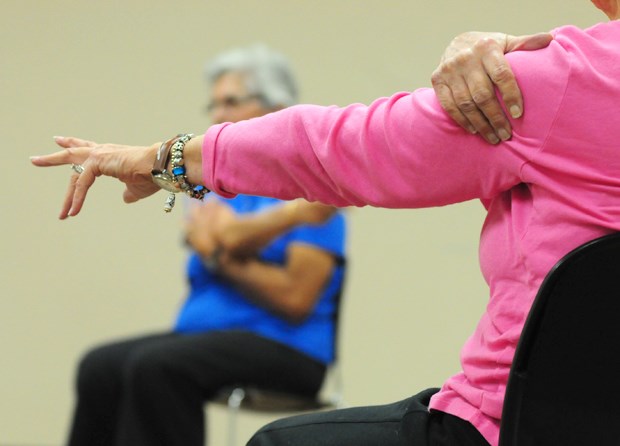I have been hearing serious concerns about the effect of COVID-19 on seniors’ mental health.
Older people say that the situation can make them feel confused, sad, depressed, emotional and anxious. Self isolating at home, which we are being advised to follow, can lead to a drop in social connectedness and we know that social connectedness is a major determinant of health and well-being for seniors.
Probably the least serious effect of the COVID-19 situation is boredom – especially when most of the normal routines, going to the seniors and recreation centre, gym, library, shopping as a fun activity, going to the park with the grandkids, coffee and lunches with friends, volunteering and so on have been curtailed.
But boredom can take its toll. I have heard many older people say that the self-imposed time alone or with only a few family members leaves them with plenty of time, but they do not have the “get up and go” they once had. As one friend self deprecatingly said, “Those cupboards that should be purged and cleaned, those photos which need organizing, or the unfinished project mouldering in my closet are not getting done – no motivation.” This can contribute to a feeling of dissatisfaction that nothing has been accomplished.
A major consequence of the COVID-19 situation for some seniors is anxiety or worsening anxiety and depression. The Canadian Mental Health Association states: “anxiety is a normal reaction to uncertainty and things that may harm us. For many of us, the coronavirus and the COVID-19 illness make for a very uncertain future. People worry about their own health and the health of their loved ones, both here and abroad. People may also have a lot of concerns around school or work, their finances, their ability to take part in important community and social events and hobbies, and other important parts of their lives.”
The association has tips for managing stress, including trying not to avoid, ignore or suppress anxious thoughts; trying to keep things in perspective (notice and challenge your thoughts if they may be extreme or unhelpful); leaning on social supports (virtually if needed); trying to get enough sleep, eating healthy, exercising and engaging in enjoyable activities; seeking information from reliable news sources only; limiting checking in on the latest news to short, defined periods; remaining focused on things that are within your control, such as washing hands, covering your mouth during coughs and sneezes and avoiding non-essential travel. Parc Retirement Living, on its blog, has also suggested setting a new daily routine, being kind to one another and yourself, getting a good nights sleep, staying connected and seeking help when you need it.
If you feel you need more support, try phoning CMHA at 604-987-6959 or the Mental Health Team (older adults) at 604-982-5600. As well, Family Services of the North Shore has set up a free and sliding scale phone in counselling service at 604-988-5281, ext. 226.
We have been asked to practise physical distancing which is important in helping to control the spread of the virus. At the same time, the B.C. government’s HealthLinkBC website suggests “physical distancing can create even greater feelings of isolation, loneliness, and sometimes depression.” It states: “People without strong social networks may become isolated. Social isolation can lead to reduced mental and physical health, as well as depression. When older people participate in their communities, everyone benefits.”
Organizations on the North Shore are trying to assist seniors so that they can stay socially connected. They have set up outreach services which include regular friendly phone calls and emails for those who use the internet. They are setting up phone trees organized by program participants who were used to taking a regular class together. They are providing food services, with the bonus of making a social connection with a senior.
West Vancouver Seniors’ Activity Centre has set up a Seniors Help Line 604-925-7280 that is available seven days a week. Jill Lawlor, West Van’s seniors’ services and community wellness manager, says that “The seniors that are not doing fine hesitate before answering. Then they usually say they do not have family (or none nearby) and their health may be compromised, and they may be afraid or unable to go out for groceries. These are usually longer conversations, as we discuss ways of helping them.”
In my conversations with some seniors they have told me that they are experiencing a heightened level of emotion, perhaps crying more often or sleeping badly – as one senior said, “things just catch up on you.” Part of the issue they say is being alone much of the day, despite being in touch with friends and family by phone and through virtual contacts.
Annwen Loverin, executive director of Silver Harbour Seniors’ Activity Centre says it’s important for people to realize that emotions and mental health can change over time.
“If you or a senior you relate to was coping last week, that may no longer be the case,” she said. “Organizations like ours are reaching out on a regular basis to local seniors to make sure they are socially connected and know how to access emotional support when they need it.”
Sensible words at this demanding time.
Margaret Coates is the co-ordinator of Lionsview Seniors’ Planning Society. She has lived on the North Shore for 50 years and has worked for and with seniors for 25 of those years. Ideas for future columns are welcome Email: lions_view@telus.net.



